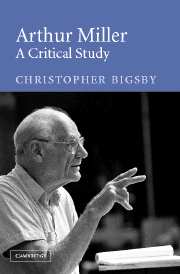Book contents
- Frontmatter
- Contents
- Acknowledgements
- Note on the text
- Introduction
- 1 The Michigan plays
- 2 The Golden Years, The Half-Bridge, Boro Hall Nocturne
- 3 The radio plays
- 4 The Man Who Had All the Luck
- 5 Focus
- 6 All My Sons
- 7 Death of a Salesman
- 8 Arthur Miller: time-traveller
- 9 An Enemy of the People
- 10 The Crucible
- 11 A Memory of Two Mondays
- 12 A View from the Bridge
- 13 Tragedy
- 14 The Misfits
- 15 After the Fall
- 16 Incident at Vichy
- 17 The Price
- 18 The Creation of the World and Other Business
- 19 The Archbishop's Ceiling
- 20 Playing for Time
- 21 The shearing point
- 22 The American Clock
- 23 The one-act plays: Two-Way Mirror, and Danger: Memory!
- 24 The Ride Down Mount Morgan
- 25 The Last Yankee
- 26 Broken Glass
- 27 Mr Peters' Connections
- 28 Resurrection Blues
- 29 Finishing the Picture
- 30 Fiction
- 31 Arthur Miller as a Jewish writer
- Notes
- Index
30 - Fiction
Published online by Cambridge University Press: 16 November 2009
- Frontmatter
- Contents
- Acknowledgements
- Note on the text
- Introduction
- 1 The Michigan plays
- 2 The Golden Years, The Half-Bridge, Boro Hall Nocturne
- 3 The radio plays
- 4 The Man Who Had All the Luck
- 5 Focus
- 6 All My Sons
- 7 Death of a Salesman
- 8 Arthur Miller: time-traveller
- 9 An Enemy of the People
- 10 The Crucible
- 11 A Memory of Two Mondays
- 12 A View from the Bridge
- 13 Tragedy
- 14 The Misfits
- 15 After the Fall
- 16 Incident at Vichy
- 17 The Price
- 18 The Creation of the World and Other Business
- 19 The Archbishop's Ceiling
- 20 Playing for Time
- 21 The shearing point
- 22 The American Clock
- 23 The one-act plays: Two-Way Mirror, and Danger: Memory!
- 24 The Ride Down Mount Morgan
- 25 The Last Yankee
- 26 Broken Glass
- 27 Mr Peters' Connections
- 28 Resurrection Blues
- 29 Finishing the Picture
- 30 Fiction
- 31 Arthur Miller as a Jewish writer
- Notes
- Index
Summary
When Arthur Miller returned to New York from the University of Michigan in 1938 he was determined to be a writer. Despite his success as a fledgling playwright, drama was by no means his only option. Indeed he quickly wrote a series of stories and sent them to the major magazines of the day. He was nothing if not confident. The stories came back but at least two of them were considerably more effective than their swift rejection suggests. They were turned down, in all probability, because one was a modernist, stream-of-consciousness piece, in many ways brilliant but difficult to see in the context of popular magazines, while another, also impressive, was much more sexually frank than would have been acceptable. He had not researched his market. In 1940 he also wrote a novel, again surprisingly accomplished, set on a freighter whose crew are deeply racist. It was a novel that featured two black characters, struggling to survive. Though the book was never finished it still stands not only as sign of his social commitments but of a talent which might have turned in another direction. Prose fiction, then, drew him in the late 1930s and early 1940s and would continue to do so, if infrequently, throughout his career.
Miller has confessed to thumbing through novels in search of dialogue as though there were a special authenticity and authority associated with the spoken word, as if characters were freed of the authorial voice at that moment and allowed to speak their lives.
- Type
- Chapter
- Information
- Arthur MillerA Critical Study, pp. 444 - 472Publisher: Cambridge University PressPrint publication year: 2004



